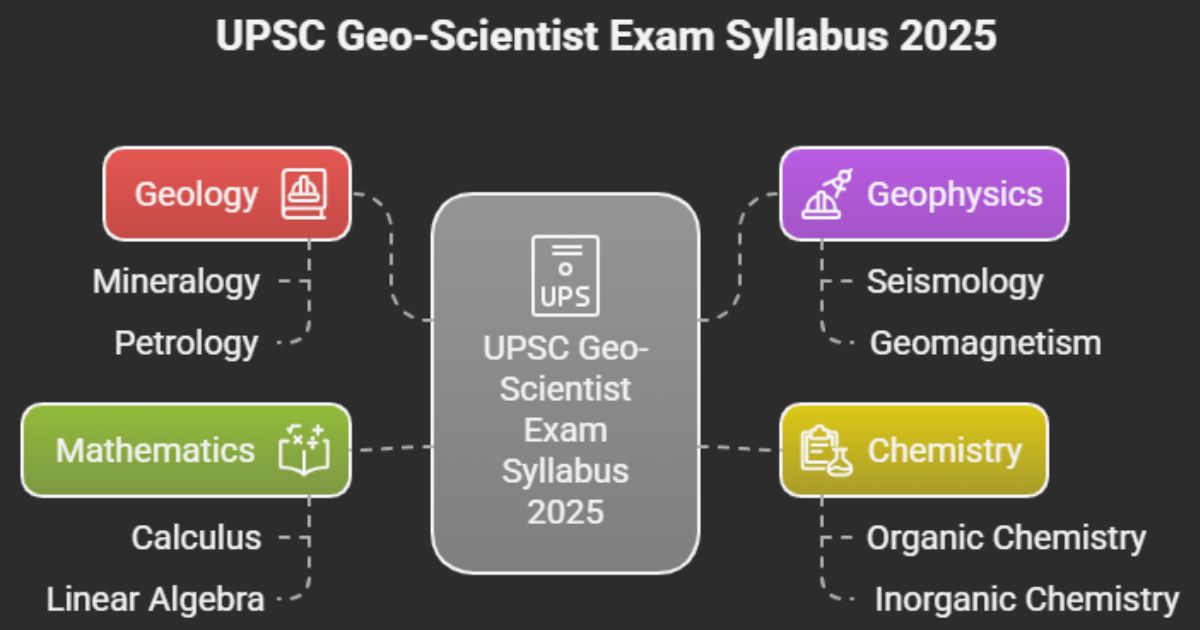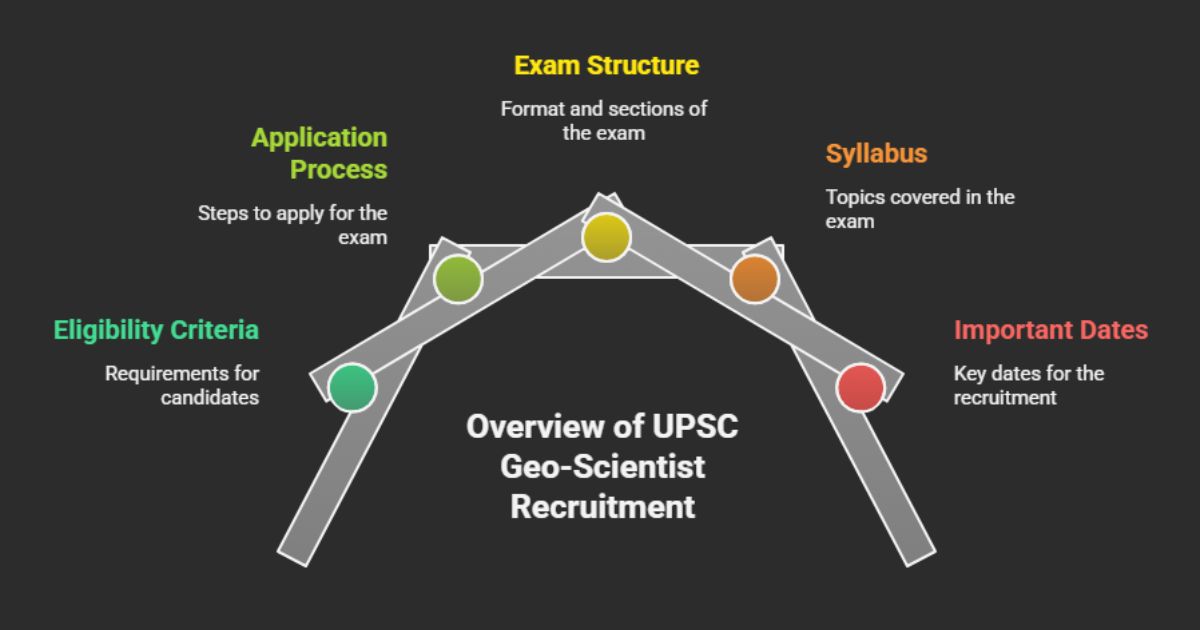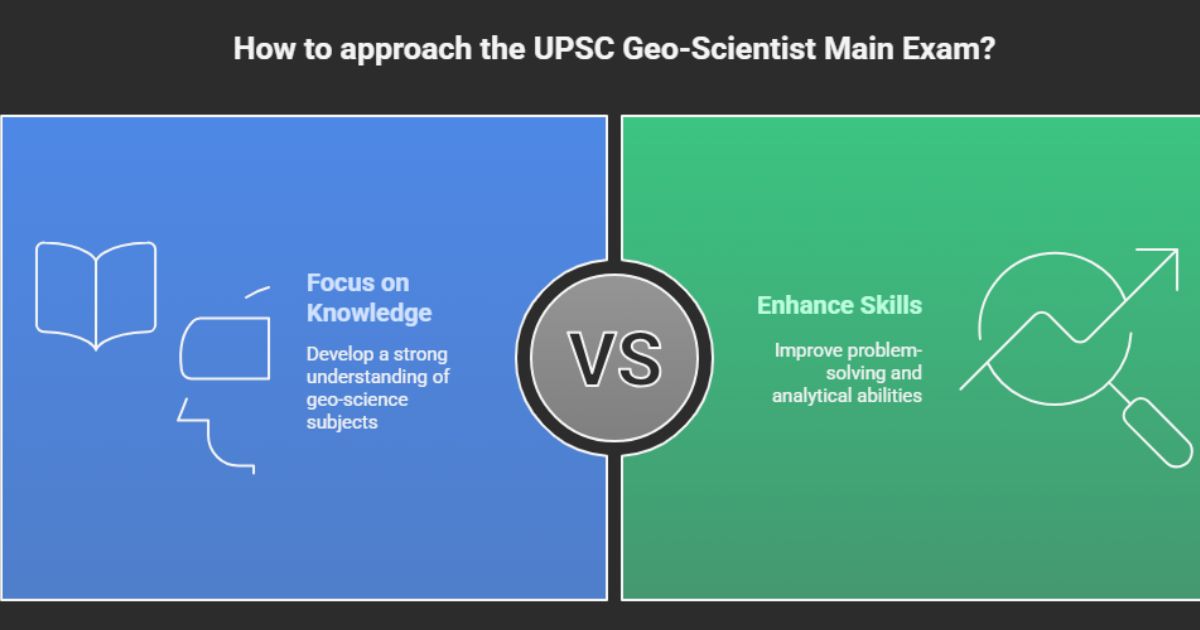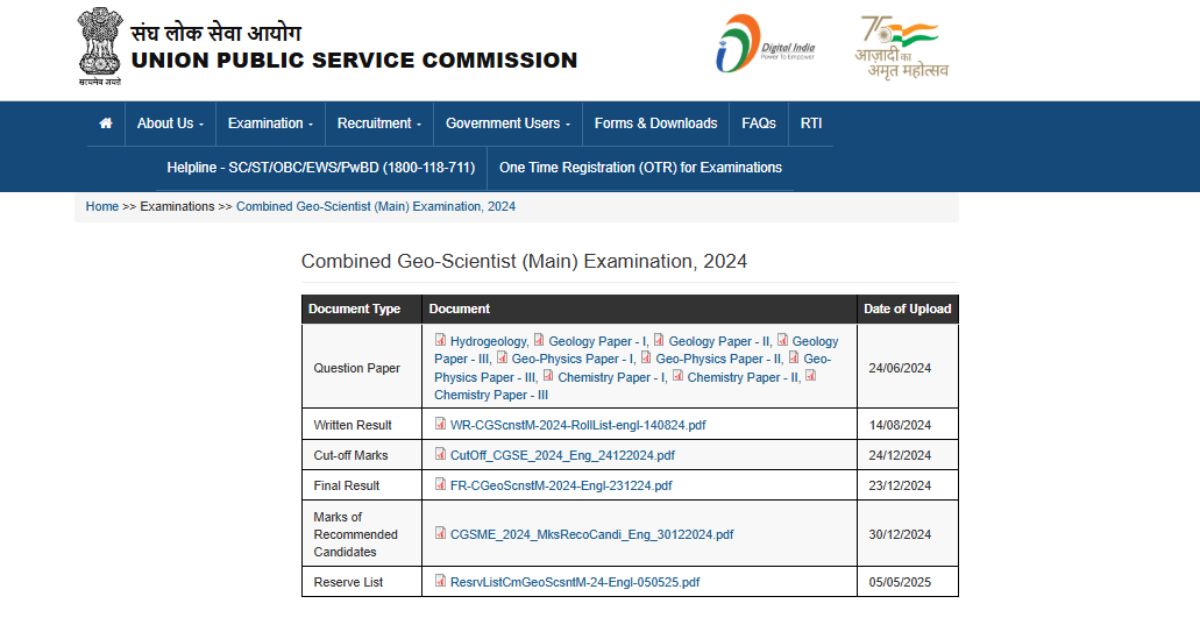The Union Public Service Commission released the UPSC Combined Geo-Scientist Main Exam 2025 notification on September 4, 2024, with the Main exam scheduled for June 21 and 22, 2025.
The application portal for the UPSC Geo-Scientist Exam is now open, and eligible candidates are encouraged to review the notification thoroughly before applying online. Candidates can submit their applications for the UPSC Geo-Scientist 2025 exam between September 4 and September 24, 2024, through the official UPSC website.
Before applying, candidates must complete registration on the One Time Registration (OTR) platform, accessible on the UPSC website. This OTR registration is a one-time requirement that can be done at any point during the year. Those already registered on the OTR platform can proceed directly to fill out the online application for the examination.
UPSC Geo-Scientist Recruitment 2025
The UPSC Combined Geo-Scientist Examination 2025 is a national-level recruitment drive to fill scientific and technical positions in the GSI and CGWB. These roles involve geological surveys, mineral exploration, groundwater management, and chemical analysis, contributing to India’s resource development and environmental sustainability.
The recruitment process is rigorous, ensuring only the most qualified candidates are selected for these critical roles.Check further down this page for the latest updates on the UPSC Geo-Scientist Notification 2025.
UPSC Geo-Scientist Notification 2025: Overview

The Union Public Service Commission published the official notification for the Combined Geo-Scientist Examination 2025 on September 4, 2024, providing comprehensive details on eligibility criteria, exam structure, and application procedures. This notification can be accessed on the UPSC website.
| Attributes | Overview |
| Exam Conducting Organization | Union Public Service Commission (UPSC) |
| Exam Name | UPSC Combined Geo-Scientist Examination 2025 |
| Vacancies | 85 |
| Application Dates | 4 September to 24 September 2024 |
| Application Mode | Online |
| Frequency of Exam | Annually |
| Job Location | India |
| Selection Process |
|
- Exam Name: Combined Geo-Scientist Examination 2025
- Conducting Body: Union Public Service Commission (UPSC)
- Posts: Geologist, Geophysicist, Chemist, Junior Hydrogeologist
- Mode of Exam: Offline (Prelims: Computer-based; Mains: Pen-and-paper)
- Total Marks: 1200 (Prelims: 400, Mains: 600, Interview: 200)
- Language: English only for Mains and Interview
- Official Website: upsc.gov.in
The notification serves as the primary guide for aspirants, providing critical information about the exam structure and requirements.
UPSC Geo-Scientist Notification Important Dates 2025
The application link for the UPSC Geo-Scientist Examination 2025 is now active, and candidates can submit their application forms until 6:00 PM on September 24, 2024. Below is a table listing all the important dates outlined in the UPSC Geo-Scientist Notification for the 2025 recruitment process:
| Event | Date |
| Notification Release Date | 4 September 2024 |
| Application Start Date | 4 September 2024 |
| Last Date to Apply | 24 September 2024 (6:00 p.m.) |
| Last Date to Pay the Application Fee | 24 September 2024 (6:00 p.m.) |
| Preliminary Examination Date | 9 February 2025 |
| Preliminary Result Date | 31 March 2025 |
| Main Examination Date | 21–22 June 2025 |
| Admit Card Release Date | To Be Announced |
| Answer Key Release Date | To Be Announced |
| Final Result/Selection Announcement | To Be Announced |
Candidates must adhere to these deadlines to ensure eligibility for the exam.
UPSC Combined Geo-Scientist 2025 Recruitment: Important Links

The UPSC Combined Geo-Scientist Examination 2025 notification can be accessed and downloaded from the official UPSC website. For convenience, we have provided direct links below to assist candidates with the UPSC Geo-Scientist Recruitment 2025 process.
| Resource | Link |
| Official UPSC Website | upsc.gov.in |
| Notification PDF | upsc.gov.in/examinations |
| Online Application Portal | upsconline.nic.in |
| Previous Years’ Question Papers | upsc.gov.in/examinations |
| Admit Card Download | upsconline.nic.in |
| Preliminary Result | upsc.gov.in/examinations |
These resources provide access to official updates, application forms, and study materials.
UPSC Geo-Scientist Eligibility Criteria 2025
Eligibility for the UPSC Combined Geo-Scientist Examination 2025 requires candidates to meet specific nationality, age, and educational qualifications. Eligible candidates must be Indian citizens, subjects of Nepal or Bhutan, Tibetan refugees in India before January 1, 1962, or persons of Indian origin from specified countries (e.g., Pakistan, Sri Lanka, or select African nations) intending permanent settlement in India.
The age limit is 21 to 32 years as of January 1, 2025, for most posts, with relaxations for reserved categories and government servants. Candidates must hold a Master’s degree from a recognized university in relevant fields such as Geology, Geophysics, Chemistry, or Hydrogeology, depending on the post applied for.
Nationality Eligibility
| Category | Eligibility Criteria |
| Citizen of India | Must be a citizen of India. |
| Subject of Nepal or Bhutan | Must be a subject of Nepal or Bhutan. |
| Tibetan Refugee | Must have arrived in India before January 1, 1962, with the intention of permanent settlement. |
| Person of Indian Origin | Must have migrated from Pakistan, Burma, Sri Lanka, Kenya, Uganda, Tanzania, Zambia, Malawi, Zaire, Ethiopia, or Vietnam with the intention of permanently settling in India. |
Note: Non-Indian citizens (except subjects of Nepal or Bhutan) require a certificate of eligibility from the Government of India.
Age Limits by Post
| Post | Age Limit (as of January 1, 2025) |
| Geologist Group ‘A’ (Geological Survey of India) | 21 to 32 years |
| Geophysicist Group ‘A’ (Geological Survey of India) | 21 to 32 years |
| Scientist ‘B’ (Geophysics) Group ‘A’ (C.G.W.B) | 21 to 32 years |
| Chemist Group ‘A’ (Geological Survey of India) | 21 to 32 years |
| Scientist ‘B’ (Chemical) Group ‘A’ (C.G.W.B) | 21 to 32 years |
| Scientist ‘B’ (Hydrogeology) Group ‘A’ (C.G.W.B) | 21 to 32 years |
| Assistant (Chemist) Group ‘B’ (C.G.W.B) | 21 to 32 years |
Age Relaxation
| Category | Upper Age Relaxation |
| SC/ST | 5 years |
| OBC, Defence Services Personnel (disabled in operations) | 3 years |
| Ex-servicemen | 5 years |
| ECOs/SSCOs | 5 years |
| Persons with Benchmark Disabilities (PwBD) | 10 years |
| Government Servants (in specified departments) | Up to 7 years |
Note: Government servants in the Geological Survey of India or Central Ground Water Board applying for specific posts (Geologist, Geophysicist, Chemist, Scientist ‘B’ in Hydrogeology, Chemical, or Geophysics) are eligible for up to 7 years of age relaxation.
Educational Qualifications by Post
| Post | Required Educational Qualification |
| Geologist Group ‘A’ (Geological Survey of India) | Master’s degree in Geological Science, Geology, Applied Geology, Geo-Exploration, Mineral Exploration, Engineering Geology, Marine Geology, Earth Science and Resource Management, Oceanography and Coastal Areas Studies, Petroleum Geosciences, or Geochemistry from a recognized university. |
| Geophysicist Group ‘A’ (Geological Survey of India) & Scientist ‘B’ (Geophysics) Group ‘A’ (C.G.W.B) | M.Sc. in Physics, Applied Physics, Geophysics, Integrated M.Sc. in Exploration Geophysics, M.Sc. in Applied Geophysics, M.Sc. in Marine Geophysics, or M.Sc. (Tech.) in Applied Geophysics from a recognized university. |
| Chemist Group ‘A’ (Geological Survey of India) & Scientist ‘B’ (Chemical) Group ‘A’ (C.G.W.B) | M.Sc. in Chemistry, Applied Chemistry, or Analytical Chemistry from a recognized university. |
| Scientist ‘B’ (Hydrogeology) Group ‘A’ (C.G.W.B) | Master’s degree in Geology, Applied Geology, Marine Geology, or Hydrogeology from a recognized university. |
| Assistant (Chemist) Group ‘B’ (C.G.W.B) | Master of Science or Integrated Master of Science in Chemistry, Applied Chemistry, Analytical Chemistry, Physical Chemistry, Inorganic Chemistry, Organic Chemistry, Hydro-Chemistry, or Industrial Chemistry from a recognized university or institute. |
Note: Degrees must be from institutions recognized by the University Grants Commission (UGC) or equivalent. Candidates awaiting final results may apply provisionally, subject to providing proof of qualification before the final selection stage.
Physical Standards
Candidates must meet physical and medical standards as specified by UPSC, particularly for fieldwork roles.
UPSC Geo-Scientist Application Process

The UPSC Combined Geo-Scientist Examination 2025 application is online at upsconline.nic.in. Candidates must register, fill in details, and upload documents like photos and signatures. The fee, usually ₹200 for general candidates (exempt for SC/ST/PwBD/female), is paid online. Applications were open from September 4 to September 24, 2024, per the official notification.The application process is online and involves the following steps:
- Visit the Portal: Go to upsconline.nic.in .
- Register: Complete Part-I registration with personal and educational details.
- Pay Fee: Pay ₹200 (exempt for SC/ST/PwBD/female candidates) via online/offline modes.
- Upload Documents: Upload a recent photograph, signature, and ID proof.
- Submit Part-II: Fill in exam center preferences and submit the form.
- Download Confirmation: Save the application form for future reference.
Application Fee:
Applicants must submit a fee while completing the online application form for the UPSC Combined Geo-Scientist Examination 2025. If opting for the “Pay by Cash” method, candidates should print the Pay-in-slip generated during Part II registration and deposit the fee at an SBI branch on the following working day.
The application fee, which varies by category, must be paid to successfully complete the application process. Ensure the payment is made as per the category-specific requirements to finalize your submission.
| Category | Fee |
| General/OBC/EWS | ₹200 |
| SC/ST/PwBD/Female | Exempted |
UPSC Geo-Scientist 2025 Selection Process
The selection process comprises three stages:
- Preliminary Examination: Objective-type, 400 marks, to screen candidates for Mains.
- Main Examination: Descriptive-type, 600 marks, focusing on stream-specific knowledge.
- Personality Test/Interview: 200 marks, assessing aptitude, leadership, and fieldwork suitability.
The final merit list is based on the total marks (1200).
UPSC Geo-Scientist Exam Pattern
To succeed in the UPSC Combined Geo-Scientist Exam 2025, understanding its structure is crucial. The exam pattern details the number of questions, total marks, duration, and subjects covered in the test.
Below, we provide a detailed overview of the UPSC Geo-Scientist Exam Pattern 2025, covering both the Preliminary and Main Examinations. This breakdown helps candidates prepare effectively for each stage of the selection process.The Main Exam is descriptive and stream-specific, conducted over two days. Below is the detailed pattern:
Combined Geo-Scientist (Preliminary) Examination
The Preliminary stage applies a negative marking of ⅓ marks for each incorrect answer, and these marks contribute to the final ranking. It includes three streams: Stream-I (Geologist & Scientist B – Hydrogeology), Stream-II (Geophysicist & Scientist B – Geophysics), and Stream-III (Chemist & Scientist B – Chemical).
|
Subject |
Duration |
Maximum Marks |
| Paper-I: General Studies | 2 Hours | 100 Marks |
| Paper-II: Subject Specific | 2 Hours | 300 Marks |
| Total | 400 Marks |
Stage-II: Combined Geo-Scientist (Main) Examination
The Main Examination features three descriptive papers per stream: Stream-I (Geologist), Stream-II (Geophysicist & Scientist B – Geophysics), Stream-III (Chemist & Scientist B – Chemical), and Stream-IV (Scientist B – Hydrogeology). Answers must be in English, with question papers provided exclusively in English.
| Subject | Duration | Maximum Marks |
| Paper-I: Subject Specific | 3 Hours | 200 Marks |
| Paper-II: Subject Specific | 3 Hours | 200 Marks |
| Paper-III: Subject Specific | 3 Hours | 200 Marks |
| Total | 600 Marks |
Key Points:
- Each paper is descriptive, requiring detailed answers with diagrams, equations, or examples.
- No negative marking in the Main Exam.
- Candidates for both Geologist and Junior Hydrogeologist posts must appear for all relevant papers.
UPSC Geo-Scientist Exam Syllabus 2025
To prepare effectively for the UPSC Geo-Scientist 2025 exam, candidates must thoroughly understand the syllabus, which acts as a guide for strategic preparation to achieve a high score. Below is a detailed breakdown of the syllabus for the Preliminary (Stage-I) and Main (Stage-II) Examinations, covering all streams and subjects.
Stage-I: Syllabus of Combined Geo-Scientist (Preliminary) Examination
Paper-I: General Studies (Common for All Streams)
| Subject | Topics |
| General Studies | Current events of national and international importance; History of India and Indian National Movement; Indian and World Geography; Indian Polity and Governance; Economic and Social Development; General Science |
Paper-II: Geology/Hydrogeology
| Subject | Topics |
| Geology/Hydrogeology | Physical Geology; Structural Geology (stress, strain, rheological characteristics of rocks, planar and linear structures); Mineralogy (Elements of Symmetry); Igneous Petrology (Magma types and evolution); Metamorphic Petrology (Limits); Sedimentology (Origin of Sediments); Paleontology (Fossils and fossilization processes); Stratigraphy (Law of superposition); Economic Geology (Properties of Mineral Deposits); Hydrogeology (Groundwater occurrence, aquifer characteristics) |
Paper-II: Geophysics
| Subject | Topics |
| Geophysics | Solid Earth Geophysics; Mathematical Methods in Geophysics; Electromagnetism; Geophysical Prospecting; Remote Sensing and Thermodynamics |
Paper-II: Chemistry
| Subject | Topics |
| Chemistry | Chemical periodicity; Chemical bonding and structure; Acids and bases; Theoretical basis of quantitative inorganic analysis; Kinetic theory and the gaseous state; Chemical thermodynamics and chemical equilibrium; Solutions of non-electrolytes; Electrochemistry; Basic organic chemistry; Stereochemistry; Types of organic reactions; Molecular Rearrangements |
Stage-II: Syllabus of Combined Geo-Scientist (Main) Examination
For the Post of Geologist/Scientist ‘B’ (Hydrogeology)
Geology: Paper-I
| Section | Topics |
| Section A | Physical Geology and Remote Sensing (evolution of Earth) |
| Section B | Principles of geological mapping in structural geology |
| Section C | Sedimentology (Classification of sedimentary rocks) |
| Section D | Paleontology (Fossil record and geological time scale) |
| Section E | Stratigraphy (Fundamental principles, stratigraphic nomenclature in India) |
Geology: Paper-II
| Section | Topics |
| Section A | Mineralogy (Symmetry, motif, Miller indices) |
| Section B | Geochemistry and isotope geology (Chemical composition of atmosphere, lithosphere, hydrosphere; geochemical cycles) |
| Section C | Igneous petrology (Viscosity) |
| Section D | Metamorphic Petrology (Boundaries, physico-chemical factors like pressure, temperature, fluids, bulk rock composition) |
| Section E | Geodynamics (Phase transitions, seismic discontinuities in the Earth) |
Geology: Paper-III
| Section | Topics |
| Section A | Ore minerals and industrial minerals (physical and optical properties of ore minerals) |
| Section B | Distribution of mineral deposits in the Indian shield, mineral economics |
| Section C | Stages of mineral exploration |
| Section D | Coal and its properties (fuel geology, engineering geology) |
| Section E | Environmental geology and natural hazards (Stefan-Boltzmann equation, planetary temperature, global climate change) |
Hydrogeology
| Section | Topics |
| Section A | Origin of water on Earth, global water cycle, occurrence and distribution of groundwater |
| Section B | Groundwater flow concepts, principles, well hydraulics |
| Section C | Water wells, groundwater levels (unidirectional and radial flow under steady/unsteady conditions) |
| Section D | Surface investigations of groundwater (geological aspects) |
| Section E | Groundwater quality and management (groundwater composition) |
For the Post of Geophysicist/Scientist ‘B’ (Geophysics)
Geophysics: Paper-I
| Part | Topics |
| Part-A: A1 | Solid Earth Geophysics |
| Part-A: A2 | Earthquake Seismology |
| Part-A: A3 | Mathematical methods in Geophysics |
| Part-A: A4 | Geophysical Inversion |
| Part-B: B1 | Mathematical Methods of Physics |
| Part-B: B2 | Electrodynamics: Electrostatics |
| Part-B: B3 | Electromagnetic Theory: Maxwell’s equations |
| Part-B: B4 | Introductory Atmospheric and Space Physics |
Geophysics: Paper-II
| Part | Topics |
| Part-A: A1 | Potential Field (Gravity and Magnetic) Methods |
| Part-A: A2 | Electrical and Electromagnetic methods |
| Part-A: A3 | Seismic Prospecting |
| Part-A: A4 | Borehole Geophysics |
| Part-B: B1 | Classical Mechanics (Inertial/non-inertial frames, Newton’s laws, Pseudo forces) |
| Part-B: B2 | Thermodynamics and Statistical Physics |
| Part-B: B3 | Atomic and Molecular Physics and Characterization |
| Part-B: B4 | Nuclear and Particle Physics |
Geophysics: Paper-III
| Part | Topics |
| Part-A: A1 | Radiometric and Airborne Geophysics |
| Part-A: A2 | Marine Geophysics |
| Part-A: A3 | Geophysical Signal Processing |
| Part-A: A4 | Remote Sensing and Geohydrology |
| Part-B: B1 | Solid State Physics and Basic Electronics (Crystalline and amorphous structure) |
| Part-B: B2 | Laser Systems (Spontaneous and Stimulated Emission) |
| Part-B: B3 | Digital electronics |
| Part-B: B4 | Quantum Mechanics (Wave-particle duality) |
For the Posts of Chemist/Scientist ‘B’ (Chemical)
Chemistry: Paper-I (Inorganic Chemistry)
| Topic | Details |
| 1 | Inorganic solids |
| 2 | Chemistry of coordination compounds |
| 3 | Acid-base titrations |
| 4 | Gravimetric Analysis |
| 5 | Redox Titrations |
| 6 | Complexometric titrations |
| 7 | Organometallic compounds |
| 8 | Nuclear chemistry |
| 9 | Chemistry of d- and f-block elements |
Chemistry: Paper-II (Physical Chemistry)
| Topic | Details |
| 1 | Kinetic theory and the gaseous state |
| 2 | Solids |
| 3 | Chemical thermodynamics and chemical equilibrium |
| 4 | Chemical kinetics and catalysis |
| 5 | Electrochemistry |
| 6 | Quantum chemistry |
| 7 | Basic principles and applications of spectroscopy |
| 8 | Photochemistry |
Chemistry: Paper-III (Analytical and Organic)
| Part | Topics |
| Part-A: A1 | Errors in quantitative analysis |
| Part-A: A2 | Separation Methods |
| Part-A: A3 | Spectroscopic methods of analysis |
| Part-A: A4 | Thermal methods of analysis |
| Part-A: A5 | X-ray methods of Analysis |
| Part-A: A6 | Inductively coupled plasma spectroscopy |
| Part-A: A7 | Analysis of geological materials |
| Part-B: B1 | Unstable, uncharged intermediates |
| Part-B: B2 | Addition reactions |
| Part-B: B3 | Reactions at the carbonyl group |
| Part-B: B4 | Oxidation and Reduction |
| Part-B: B5 | Electrocyclic Reactions |
| Part-B: B6 | Spectroscopic methods of analysis |
UPSC Geo-Scientist Answer Key 2025
The UPSC releases the official answer key for the Preliminary Exam after the results are declared, typically on the official website. For the Main Exam, no official answer key is provided due to its descriptive nature.
UPSC Geo-Scientist Result 2025
The UPSC Combined Geo-Scientist Result 2025 for the Preliminary exam, held on February 9, 2025, was announced on March 31, 2025, on upsc.gov.in. The Main exam, scheduled for June 21 and 22, 2025, will likely have its results released in late July or early August 2025, followed by interview scheduling. The final result, combining marks from all stages, will be declared after the Personality Test, expected by late 2025. Candidates can check their results by entering their roll number on the UPSC portal.
UPSC Geo-Scientist 2025 Exam Cut-off
The cut-off marks vary annually based on vacancies, difficulty level, and candidate performance. The tentative cut-off for 2025 (out of 1200) is:
| Category | Geologist | Geophysicist | Chemist | Junior Hydrogeologist |
| General | 750–800 | 740–790 | 760–810 | 730–780 |
| OBC | 700–750 | 690–740 | 710–760 | 680–730 |
| SC/ST | 650–700 | 640–690 | 660–710 | 630–680 |
The official cut-off will be released with the final result.
UPSC Geo-Scientist 2025 Salary
Selected candidates receive salaries under the 7th Central Pay Commission:
| Post | Pay Scale | Grade Pay | Approximate Salary |
| Geologist | ₹56,100–₹1,77,500 | Level 10 | ₹70,000–₹80,000 |
| Geophysicist | ₹56,100–₹1,77,500 | Level 10 | ₹70,000–₹80,000 |
| Chemist | ₹56,100–₹1,77,500 | Level 10 | ₹70,000–₹80,000 |
| Junior Hydrogeologist | ₹56,100–₹1,77,500 | Level 10 | ₹70,000–₹80,000 |
Additional benefits include DA, HRA, medical facilities, and pension schemes.
Preparation Strategies for the Main Exam
The Main Exam’s descriptive format demands a strategic approach. Below are detailed strategies:
Understand the Syllabus
- Download the syllabus from upsc.gov.in and map it to your study plan.
- Identify high-weightage topics, e.g., stratigraphy (Geology), seismic prospecting (Geophysics), or organic synthesis (Chemistry).
Create a Study Plan
- Timeline: Begin preparation 8–10 months in advance.
- Daily Schedule: Study 8–10 hours, dividing time across papers and practice.
- Weekly Targets: Cover 2–3 topics per week, with one day for revision.
Sample 8-Month Study Plan:
| Month | Focus Area | Tasks |
| 1–2 | Fundamentals | Study core concepts, refer to standard textbooks, and make notes. |
| 3–4 | Advanced Topics | Cover applied topics, solve numericals, and practice diagrams. |
| 5–6 | Answer Writing | Write 2–3 answers daily, take mock tests, and analyze previous papers. |
| 7–8 | Revision | Revise notes, focus on weak areas, and simulate exam conditions. |
Master Answer Writing
- Structure: Use introduction, body (with examples/diagrams), and conclusion.
- Diagrams: Include geological maps, seismic profiles, or molecular structures.
- Practice: Write answers under timed conditions (10–12 minutes per 20-mark question).
- Feedback: Get answers evaluated by mentors or peers.
Use Standard Resources
| Stream | Recommended Books |
| Geology | Principles of Igneous and Metamorphic Petrology by J.D. Winter, Structural Geology by Haakon Fossen |
| Geophysics | Introduction to Seismology by P.M. Shearer, Fundamentals of Geophysics by W. Lowrie |
| Chemistry | Inorganic Chemistry by J.E. Huheey, Organic Chemistry by J. Clayden |
| Hydrogeology | Groundwater by Freeze and Cherry, Applied Hydrogeology by C.W. Fetter |
Solve Previous Papers
- Access papers from upsc.gov.in or platforms like Prepp.in.
- Practice writing full-length papers to improve speed and presentation.
Stay Updated
- Follow geoscience journals like Current Science or Journal of Earth System Science.
- Incorporate recent developments (e.g., mineral discoveries, groundwater policies) into answers.
Take Mock Tests
- Join test series from StudyIQ, or Vision IAS.
- Simulate exam conditions to build stamina and time management skills.
Exam Day Tips
- Read Carefully: Understand question requirements before answering.
- Prioritize: Attempt high-scoring or familiar questions first.
- Use Stationery: Carry pens, pencils, and a ruler for neat diagrams.
- Time Management: Allocate 10–12 minutes per 20-mark question.
- Stay Calm: Take deep breaths to manage stress.
Key Learnings
The UPSC Combined Geo-Scientist Main Exam 2025 is a gateway to prestigious careers in geosciences. With a thorough understanding of the syllabus, disciplined preparation, and effective answer-writing practice, candidates can excel in this challenging exam.
Leverage standard resources, stay updated with current developments, and simulate exam conditions through mock tests. By mastering both theoretical and applied aspects of your stream, you can secure a top rank and contribute to India’s scientific and environmental progress.
For more detailed insights, updates, and preparation resources on the UPSC Combined Geo-Scientist Main Exam 2025, we invite you to visit our website, Exam Results Live where you can explore additional tools and guides to support your journey.
Best wishes for your preparation and success in the UPSC Combined Geo-Scientist Examination 2025!
Frequently Asked Questions (FAQs)
Q1. What is the exam pattern for the UPSC Combined Geo-Scientist Main Exam 2025?
A. Three descriptive papers per stream, 200 marks each, totaling 600 marks. Each paper is 3 hours, held on June 21 and 22, 2025. No negative marking; answers in English only.
Q2. How can I download the UPSC Combined Geo-Scientist Main Exam 2025 admit card?
A. Visit upsc.gov.in, check “What’s New,” find the admit card link (available late May 2025), enter registration ID and date of birth, then download and print.
Q3. What is the syllabus for the UPSC Combined Geo-Scientist Main Exam 2025?
A. Stream-specific: Geology (Mineralogy, Ore Deposits), Geophysics (Seismic Prospecting, Electrodynamics), Chemistry (Redox Titrations, Spectroscopy), Hydrogeology (Groundwater Flow). Check UPSC website for details.
Q4. What are the qualifying criteria for the UPSC Combined Geo-Scientist Main Exam 2025?
A. Score above the cut-off in the 600-mark Main Exam to qualify for the Personality Test. Final merit combines Preliminary (400 marks), Main, and Interview (200 marks).
Q5. How should I prepare for the UPSC Combined Geo-Scientist Main Exam 2025?
A. Study stream-specific topics, use books like “Principles of Physical Geology,” practice descriptive answers, revise Master’s concepts, solve past papers, and manage time for 3-hour exams.
